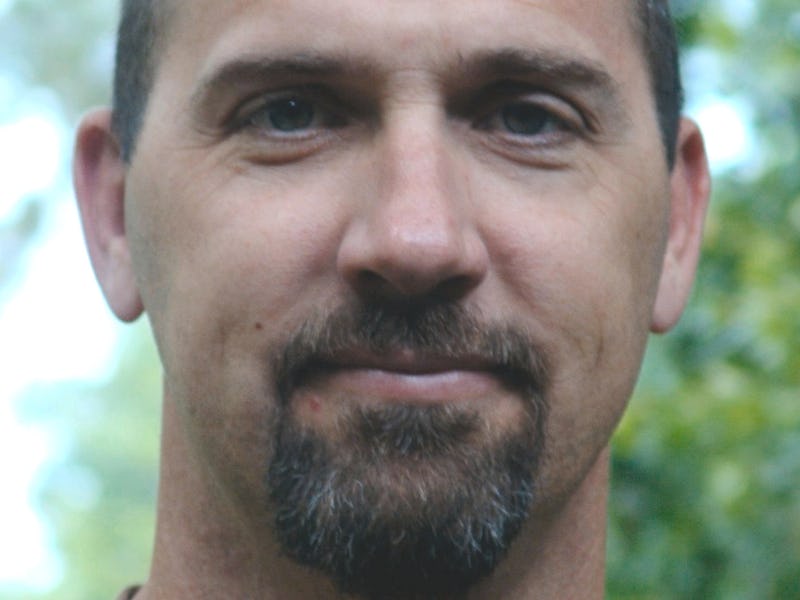Author Tony Bertauski Finds the Zen In Science Fiction | Asking The Prophet
The 'Annihilation of Foreverland' author invents futures with altered consciousness.

In Asking the Prophet, we probe the brains of sci-fi and speculative fiction writers. This week, we spoke to Tony Bertauski about philosophical sci-fi, artificial intelligence, and YA.
Where do you get your ideas?
What’s fun about science fiction is you can leap as far into the ridiculous future as you want. A lot of my main ideas deal with what exactly does it mean to be human, what is consciousness versus artificial intelligence, and also what does it mean to be a human in terms of having a human body versus not having a human body.
A lot of the main things I write about has to do with a lot of my history that’s related to zen and Buddhism and consciousness and awareness — spiritual roots that I’ve cross-connected with a passion for science fiction.
At one time, I got this crazy idea that I was going to write a romance novel. I just wanted to write it because romance is a big genre and I thought I’d cash in. I got halfway through and I realized I can’t write this anymore, I just don’t care about this. I don’t read romance, so how the hell am I supposed to write about it? All I could think about was writing my next sci-fi novel. I guess I got lucky because once I get into a story, I’m having as much fun writing it and I just hope that other people enjoy reading it.
Do you do a lot of research and reading about artificial intelligence?
As odd as it sounds, I read science fiction a lot when I was younger, but I’ve trailed off recently to the point where it’s been awhile since I’ve even read a novel. I know some of the big writers find that if you’re going to be a writer, you should be an avid reader. One of the advantages I found in not being an avid fiction reader is that I don’t inadvertently lift ideas. I find I spend more time listening to audiobooks about neuroscience and where we’re at. What’s cool is some of the ideas that sci-fi has written about, now you see news that shows not only is this a possibility, but it may not be too far into the future that we might be seeing these things happen. That’s what’s kind of fun about writing fiction: You can leap out into a ridiculous future and then all of a sudden see parts of reality start to come from that.
Is there any scientific concept that’s particularly fascinated you recently and sent your brain whirring with sci-fi ideas?
There were some stories about the possibility of downloading consciousness or being able to back up consciousness. That really gets to the root of a lot of stories I’m writing. Is consciousness a collection of memories? Is it something else? Can we absolutely identify it? There’s also one of my main themes that keeps popping up: Taking an artificial stem cell with absolutely no coding errors whatsoever — it’s a synthetic cell, so it’s not organic — and then looking at the ethics and morals behind it. If your body is not organic, are you still a human?
You start seeing all these stories of 3D printing and biological printing and what that entails. We start to see implants through artificial means. There’s stuff too about being able to integrate the brain, which can perceive thoughts, and then start collecting the “mind” in an artificial sense. If we can have a body that no longer gets sick and we can control the emotions that we choose to have, then what?
Do you think the sub-genre of philosophical sci-fi is growing?
If you look at the different genres of sci-fi, you can chop it up into several: space opera, military. There’s a half dozen to a dozen very specific types of science fiction. I tend to go in that [philosophical] direction. Ex Machina and that sort of thing is right in my wheelhouse.
It’s always been there to some extent. You see a couple movies here and there that come out, but some of them aren’t really big blockbusters. I think it’ll continue to be a sub-genre that will find its niche.
When I first started, I remember specifically wanting to write with all of these kind of zen, Buddhist, philosophical ideas, but I wanted it to be exciting and adventurous and thrilling. That’s always been my goal, to create these Hunger Games-type story arcs that have an undercurrent of thoughtfulness. Some people don’t get it. They say “I enjoyed it, it was fun.” But others seem to pick it up. It’s my idea to try to integrate it in a way that’s more accessible.
Who are some of your inspirations and influences?
I know that’s a little cliche to say Stephen King, but he is one of the masters in terms of fiction writing. There are other smaller ones. Neal Shusterman has a novel called Unwind, with one of the best chapters in young adult sci-fi. One thing about writing and reading is there’s a certain voice and style that as a reader I tend to really gel with. There are a lot of great writers out there, but I just don’t connect with a lot of them. Philosophical sci-fi really gels with me.